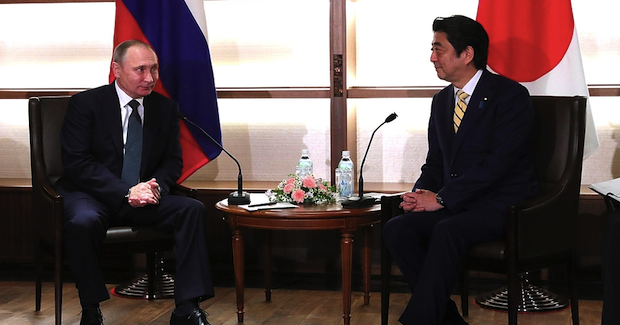A Lukewarm Hot Springs Summit in Japan

Russian President Vladimir Putin held all the cards in the Kuril Islands negotiations with Japanese Prime Minister Shinzo Abe on 15-16 December. Amid a rapidly changing geopolitical landscape there were advances, but those who expected that the two leaders would resolve the decades-old territorial dispute at one stroke were disappointed.
Putin politely declined to bathe with Abe in Nagato’s famed hot springs, subtly signalling that Russia-Japan relations have not yet matured sufficiently for such an intimacy to happen.
However, the summit did result in some deliverables. The two sides agreed to start consultations on arrangements for joint economic development of the disputed South Kurils (called the Northern Territories in Japan). This represents a reversal of Tokyo’s previous position that considered any business activities on the Russian-administered islands as potentially compromising Japan’s sovereignty claims.
Putin promised to facilitate access to ancestral graves for the former Japanese residents of the islands, who had been expelled after the Soviet Union took the territories in 1945 as a prize of war. In a reciprocal gesture, Tokyo announced relaxation of visa rules for Russian citizens visiting Japan. Putin and Abe also presided over the signing of around 70 commercial agreements, worth US$2.5 billion (A$3.45 billion), although most of them were non-binding memorandums of understanding.
The meeting also carried great international symbolism. For Putin, an official visit to a major G7 country was another blow to the Washington-led diplomatic blockade imposed on Russia in the wake of the Ukraine crisis. For Abe, the two-day meeting with the Russian leader provided an opportunity to show to domestic and foreign audiences that Japan is strengthening ties with a great power next door, helping to dispel the notion that Tokyo is diplomatically isolated in its own neighbourhood.
Although the summit ended without any visible advancement on the territorial issue, there are still reasons for cautious optimism. Part of it is due to the fact that Putin and Abe are both strong leaders enjoying high and sustainable levels of popularity and trust in their respective nations. Both are capable of making bold and unorthodox decisions in foreign policy with confidence that the public and elites will support them.
Putin and Abe speak a common language in terms of their outlook. In domestic politics both men lean toward conservative values, while aspiring to the vision of their countries as influential great power players on the world stage. Importantly, Putin is going to stay in office until 2024, provided he runs in the next presidential election scheduled for 2018, while Abe will most likely have his term as the president of the ruling LDP—and the country’s prime minister—extended until 2021.
Apart from personal factors, there are geopolitical and geoeconomic considerations encouraging the two countries to seek rapprochement. Being locked in a confrontation with the West, Moscow hopes to find in Japan a major developed partner able to do business with Russia on a purely pragmatic basis. Furthermore, the Kremlin sees better ties with Tokyo as an essential element in its ongoing efforts to engage Asia and boost the development of Russia’s vast eastern territories. Without Japan, Russia’s Asian pivot might risk being lopsided and excessively dependent on China.
For its part, Japan finds itself in an increasingly complicated security environment in its immediate neighbourhood. The rise of China, rife with military-political implications, causes angst among many in Japan. North Korea, which is steadily advancing its nuclear and missile programs, is a growing threat, while Tokyo’s political relations with South Korea remain lukewarm at best.
Meanwhile, the alliance with the United States, long the cornerstone of Japan’s foreign policy, looks less and less ironclad, something that was emphasised by the Trump victory. Under such circumstances, it becomes indispensable for Tokyo to attempt a true normalisation of relations with Russia—probably Japan’s only neighbour that does nor harbour anti-Japanese sentiments. Geoeconomic considerations also play a role, with the Russian Far East’s rich energy resources being an obvious option to enhance Japan’s energy security.
That said, true normalisation of relations, manifested in the form of a peace treaty, will require resolution of the territorial problem. Judging from his statements, Putin is prepared to make a deal with Japan on the basis of the 1956 Soviet-Japanese Declaration. In this document, Moscow agreed to transfer to Japan two smaller pieces of the disputed South Kurils—the island of Shikotan and the group of islets called Habomai.
Putin seems ready to negotiate the conditions under which the transfer of Shikotan and Habomai could take place. It is incorrect to argue, as some commentators do post-Crimea, that Putin only takes land and does not give it away. In fact, Putin has a record of making territorial concessions with the neighbouring countries. In 2004, he signed an agreement with China that divided up the Russian-controlled islands on the Amur River. In 2010, Russia reached a compromise deal with Norway on a disputed sector of the Barents Sea.
However, there are no indications that the Russian government is willing to relinquish sovereignty over the two bigger islands, Kunashir and Iturup, that make up 93 per cent of the disputed South Kuril territories. Kunashir and Iturup are no small potatoes, covering 4,700 square kilometres of land and having 14,000 permanent Russian residents. They are surrounded by extremely rich fishing grounds.
The two islands are also strategically important, guarding access to the Sea of Okhotsk and making it Russia’s internal lake. It is hard to imagine what kind of inducements Japan could offer for Russia to give up such valuable pieces of real estate.
Even with Shikotan and Habomai, Moscow is sure to ask a dear price. In his public statements, Putin has hinted at what Russia wants in return for the islands. First, he stresses the importance of expanding economic and humanitarian ties with Japan. What he means by this is not just symbolic investment projects, easier visa rules and a couple of high-tech hospitals that may be built by Japan in the Russian Far East.
Moscow expects Japan to commit to multibillion long-term investments into fixed assets on Russian soil that cannot later be withdrawn or liquidated easily if the political climate changes. Second, Putin makes it clear that Japan needs to exit the anti-Russia sanctions regime. Third, Moscow is likely to seek assurances from Tokyo that the islands to be transferred would not host US military facilities, thus driving a wedge in the US-Japan alliance.
To make Abe more receptive to his conditions, Putin is playing hardball with Tokyo. The Russian ministry of defence has taken highly publicised steps to remilitarise the Kuril Islands, including their disputed southern part. Just a month before the Nagato summit, the Russian military announced that deadly anti-ship missiles had been deployed to Kunashir and Iturup.
Moscow also seems eager to exploit Tokyo’s growing concerns about China and its fear of an anti-Japanese China-Russia axis. In June, in what most likely was a coordinated move, Russian and Chinese warships sailed simultaneously into the waters off the Senkaku (Diaoyu) Islands in the East China Sea whose ownership is a matter of an acute controversy between Tokyo and Beijing. In November, a Russian anti-submarine helicopter flew near the Senkakus, prompting Japan to scramble fighter jets, while Russian Navy vessels were also spotted in nearby waters.
Putin holds all the cards in the territorial dispute. Most importantly, time is on Russia’s side. It has been 71 years since the islands were annexed by the Soviets, while the average age of the surviving former Japanese Kuril residents is now over 81 years. The longer Moscow holds effective control over the islands, the more entrenched it becomes. This explains why Putin, in marked contrast to Abe, is in no rush to settle the issue and can afford to wait until Tokyo accepts Moscow’s terms for a compromise.
Artyom Lukin is associate professor at the School of Regional and International Studies at Far Eastern Federal University in Vladivostok.
This article is published under a Creative Commons Licence and may be republished with attribution.





